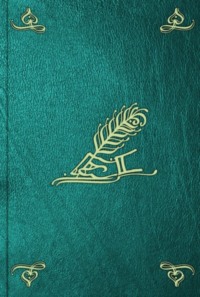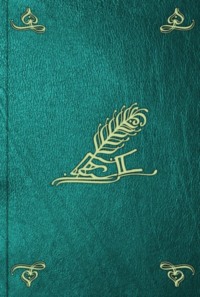 полная версия
полная версияCharles Darwin: His Life Told in an Autobiographical Chapter, and in a Selected Series of His Published Letters
CHAPTER XIV.
THE SPREAD OF EVOLUTION.
1861 – 1871
The beginning of the year 1861 saw my father engaged on the 3rd edition (2000 copies) of the Origin, which was largely corrected and added to, and was published in April, 1861.
On July 1, he started, with his family, for Torquay, where he remained until August 27 – a holiday which he characteristically enters in his diary as "eight weeks and a day." The house he occupied was in Hesketh Crescent, a pleasantly placed row of houses close above the sea, somewhat removed from what was then the main body of the town, and not far from the beautiful cliffed coast-line in the neighbourhood of Anstey's Cove.
During the Torquay holiday, and for the remainder of the year, he worked at the fertilisation of orchids. This part of the year 1861 is not dealt with in the present chapter, because (as explained in the preface) the record of his life, seems to become clearer when the whole of his botanical work is placed together and treated separately. The present chapter will, therefore, include only the progress of his work in the direction of a general amplification of the Origin of Species—e. g., the publication of Animals and Plants and the Descent of Man. It will also give some idea of the growth of belief in evolutionary doctrines.
With regard to the third edition, he wrote to Mr. Murray in December, 1860: —
"I shall be glad to hear when you have decided how many copies you will print off – the more the better for me in all ways, as far as compatible with safety; for I hope never again to make so many corrections, or rather additions, which I have made in hopes of making my many rather stupid reviewers at least understand what is meant. I hope and think I shall improve the book considerably."
An interesting feature in the new edition was the "Historical Sketch of the Recent Progress of Opinion on the Origin of Species,"215 which now appeared for the first time, and was continued in the later editions of the work. It bears a strong impress of the author's personal character in the obvious wish to do full justice to all his predecessors, – though even in this respect it has not escaped some adverse criticism.
A passage in a letter to Hooker (March 27, 1861) gives the history of one of his corrections.
"Here is a good joke: H. C. Watson (who, I fancy and hope, is going to review the new edition of the Origin) says that in the first four paragraphs of the introduction, the words 'I,' 'me,' 'my,' occur forty-three times! I was dimly conscious of the accursed fact. He says it can be explained phrenologically, which I suppose civilly means, that I am the most egotistically self-sufficient man alive; perhaps so. I wonder whether he will print this pleasing fact; it beats hollow the parentheses in Wollaston's writing.
"I am, my dear Hooker, ever yours,
"C. Darwin."P.S. – Do not spread this pleasing joke; it is rather too biting."
He wrote a couple of years later, 1863, to Asa Gray, in a manner which illustrates his use of the personal pronoun in the earlier editions of the Origin: —
"You speak of Lyell as a judge; now what I complain of is that he declines to be a judge… I have sometimes almost wished that Lyell had pronounced against me. When I say 'me,' I only mean change of species by descent. That seems to me the turning-point. Personally, of course, I care much about Natural Selection; but that seems to me utterly unimportant, compared to the question of Creation or Modification."
He was, at first, alone, and felt himself to be so in maintaining a rational workable theory of Evolution. It was therefore perfectly natural that he should speak of "my" theory.
Towards the end of the present year (1861) the final arrangements for the first French edition of the Origin were completed, and in September a copy of the third English edition was despatched to Mdlle. Clémence Royer, who undertook the work of translation. The book was now spreading on the Continent, a Dutch edition had appeared, and, as we have seen, a German translation had been published in 1860. In a letter to Mr. Murray (September 10, 1861), he wrote, "My book seems exciting much attention in Germany, judging from the number of discussions sent me." The silence had been broken, and in a few years the voice of German science was to become one of the strongest of the advocates of Evolution.
A letter, June 23, 1861, gave a pleasant echo from the Continent of the growth of his views: —
Hugh Falconer 216 to C. Darwin. 31 Sackville St., W., June 23, 1861My dear Darwin, – I have been to Adelsberg cave and brought back with me a live Proteus anguinus, designed for you from the moment I got it; i. e. if you have got an aquarium and would care to have it. I only returned last night from the Continent, and hearing from your brother that you are about to go to Torquay, I lose no time in making you the offer. The poor dear animal is still alive – although it has had no appreciable means of sustenance for a month – and I am most anxious to get rid of the responsibility of starving it longer. In your hands it will thrive and have a fair chance of being developed without delay into some type of the Columbidæ – say a Pouter or a Tumbler.
My dear Darwin, I have been rambling through the north of Italy, and Germany lately. Everywhere have I heard your views and your admirable essay canvassed – the views of course often dissented from, according to the special bias of the speaker – but the work, its honesty of purpose, grandeur of conception, felicity of illustration, and courageous exposition, always referred to in terms of the highest admiration. And among your warmest friends no one rejoiced more heartily in the just appreciation of Charles Darwin than did,
Yours very trulyMy father replied: —
Down [June 24, 1861].My dear Falconer, – I have just received your note, and by good luck a day earlier than properly, and I lose not a moment in answering you, and thanking you heartily for your offer of the valuable specimen; but I have no aquarium and shall soon start for Torquay, so that it would be a thousand pities that I should have it. Yet I should certainly much like to see it, but I fear it is impossible. Would not the Zoological Society be the best place? and then the interest which many would take in this extraordinary animal would repay you for your trouble.
Kind as you have been in taking this trouble and offering me this specimen, to tell the truth I value your note more than the specimen. I shall keep your note amongst a very few precious letters. Your kindness has quite touched me.
Yours affectionately and gratefullyMy father, who had the strongest belief in the value of Asa Gray's help, was anxious that his evolutionary writings should be more widely known in England. In the autumn of 1860, and the early part of 1861, he had a good deal of correspondence with him as to the publication, in the form of a pamphlet, of Gray's three articles in the July, August, and October numbers of the Atlantic Monthly, 1860.
The reader will find these articles republished in Dr. Gray's Darwiniana, p. 87, under the title "Natural Selection not inconsistent with Natural Theology." The pamphlet found many admirers, and my father believed that it was of much value in lessening opposition, and making converts to Evolution. His high opinion of it is shown not only in his letters, but by the fact that he inserted a special notice of it in a prominent place in the third edition of the Origin. Lyell, among others, recognised its value as an antidote to the kind of criticism from which the cause of Evolution suffered. Thus my father wrote to Dr. Gray: "Just to exemplify the use of your pamphlet, the Bishop of London was asking Lyell what he thought of the review in the Quarterly, and Lyell answered, 'Read Asa Gray in the Atlantic.'"
On the same subject he wrote to Gray in the following year: —
"I believe that your pamphlet has done my book great good; and I thank you from my heart for myself: and believing that the views are in large part true, I must think that you have done natural science a good turn. Natural Selection seems to be making a little progress in England and on the Continent; a new German edition is called for, and a French one has just appeared."
The following may serve as an example of the form assumed between these friends of the animosity at that time so strong between England and America217: —
"Talking of books, I am in the middle of one which pleases me, though it is very innocent food, viz. Miss Cooper's Journal of a Naturalist. Who is she? She seems a very clever woman, and gives a capital account of the battle between our and your weeds.218 Does it not hurt your Yankee pride that we thrash you so confoundedly? I am sure Mrs. Gray will stick up for your own weeds. Ask her whether they are not more honest, downright good sort of weeds. The book gives an extremely pretty picture of one of your villages; but I see your autumn, though so much more gorgeous than ours, comes on sooner, and that is one comfort."
A question constantly recurring in the letters to Gray is that of design. For instance: —
"Your question what would convince me of design is a poser. If I saw an angel come down to teach us good, and I was convinced from others seeing him that I was not mad, I should believe in design. If I could be convinced thoroughly that life and mind was in an unknown way a function of other imponderable force, I should be convinced. If man was made of brass or iron and no way connected with any other organism which had ever lived, I should perhaps be convinced. But this is childish writing.
"I have lately been corresponding with Lyell, who, I think, adopts your idea of the stream of variation having been led or designed. I have asked him (and he says he will hereafter reflect and answer me) whether he believes that the shape of my nose was designed. If he does I have nothing more to say. If not, seeing what Fanciers have done by selecting individual differences in the nasal bones of pigeons, I must think that it is illogical to suppose that the variations, which natural selection preserves for the good of any being, have been designed. But I know that I am in the same sort of muddle (as I have said before) as all the world seems to be in with respect to free will, yet with everything supposed to have been foreseen or preordained."
The shape of his nose would perhaps not have been used as an illustration, if he had remembered Fitz-Roy's objection to that feature (see Autobiography, p. 26). He should, too, have remembered the difficulty of predicting the value to an organism of an apparently unimportant character.
In England Professor Huxley was at work in the evolutionary cause. He gave, in 1862, two lectures at Edinburgh on Man's Place in Nature. My father wrote: —
"I am heartily glad of your success in the North. By Jove, you have attacked Bigotry in its stronghold. I thought you would have been mobbed. I am so glad that you will publish your Lectures. You seem to have kept a due medium between extreme boldness and caution. I am heartily glad that all went off so well."
A review,219 by F. W. Hutton, afterwards Professor of Biology and Geology at Canterbury, N. Z., gave a hopeful note of the time not far off when a broader view of the argument for Evolution would be accepted. My father wrote to the author220: —
Down, April 20th, 1861.Dear Sir, – I hope that you will permit me to thank you for sending me a copy of your paper in the Geologist, and at the same time to express my opinion that you have done the subject a real service by the highly original, striking, and condensed manner with which you have put the case. I am actually weary of telling people that I do not pretend to adduce direct evidence of one species changing into another, but that I believe that this view in the main is correct, because so many phenomena can be thus grouped together and explained.
But it is generally of no use, I cannot make persons see this. I generally throw in their teeth the universally admitted theory of the undulations of light – neither the undulations, nor the very existence of ether being proved – yet admitted because the view explains so much. You are one of the very few who have seen this, and have now put it most forcibly and clearly. I am much pleased to see how carefully you have read my book, and what is far more important, reflected on so many points with an independent spirit. As I am deeply interested in the subject (and I hope not exclusively under a personal point of view) I could not resist venturing to thank you for the right good service which you have done. Pray believe me, dear sir,
Yours faithfully and obliged.It was a still more hopeful sign that work of the first rank in value, conceived on evolutionary principles, began to be published.
My father expressed this idea in a letter to the late Mr. Bates.221
"Under a general point of view, I am quite convinced (Hooker and Huxley took the same view some months ago) that a philosophic view of nature can solely be driven into naturalists by treating special subjects as you have done."
This refers to Mr. Bates' celebrated paper on mimicry, with which the following letter deals: —
Down Nov. 20 [1862].Dear Bates, – I have just finished, after several reads, your paper.222 In my opinion it is one of the most remarkable and admirable papers I ever read in my life. The mimetic cases are truly marvellous, and you connect excellently a host of analogous facts. The illustrations are beautiful, and seem very well chosen; but it would have saved the reader not a little trouble, if the name of each had been engraved below each separate figure. No doubt this would have put the engraver into fits, as it would have destroyed the beauty of the plate. I am not at all surprised at such a paper having consumed much time. I am rejoiced that I passed over the whole subject in the Origin, for I should have made a precious mess of it. You have most clearly stated and solved a wonderful problem. No doubt with most people this will be the cream of the paper; but I am not sure that all your facts and reasonings on variation, and on the segregation of complete and semi-complete species, is not really more, or at least as valuable a part. I never conceived the process nearly so clearly before; one feels present at the creation of new forms. I wish, however, you had enlarged a little more on the pairing of similar varieties; a rather more numerous body of facts seems here wanted. Then, again, what a host of curious miscellaneous observations there are – as on related sexual and individual variability: these will some day, if I live, be a treasure to me.
With respect to mimetic resemblance being so common with insects, do you not think it may be connected with their small size; they cannot defend themselves; they cannot escape by flight, at least, from birds, therefore they escape by trickery and deception?
I have one serious criticism to make, and that is about the title of the paper; I cannot but think that you ought to have called prominent attention in it to the mimetic resemblances. Your paper is too good to be largely appreciated by the mob of naturalists without souls; but, rely on it, that it will have lasting value, and I cordially congratulate you on your first great work. You will find, I should think, that Wallace will appreciate it. How gets on your book? Keep your spirits up. A book is no light labour. I have been better lately, and working hard, but my health is very indifferent. How is your health? Believe me, dear Bates,
Yours very sincerely.1863Although the battle223 of Evolution was not yet won, the growth of belief was undoubtedly rapid. So that, for instance, Charles Kingsley could write to F. D. Maurice224:
"The state of the scientific mind is most curious; Darwin is conquering everywhere, and rushing in like a flood, by the mere force of truth and fact."
The change did not proceed without a certain amount of personal bitterness. My father wrote in February, 1863: —
"What an accursed evil it is that there should be all this quarrelling within what ought to be the peaceful realms of science."
I do not desire to keep alive the memories of dead quarrels, but some of the burning questions of that day are too important from the biographical point of view to be altogether omitted. Of this sort is the history of Lyell's conversion to Evolution. It led to no flaw in the friendship of the two men principally concerned, but it shook and irritated a number of smaller people. Lyell was like the Mississippi in flood, and as he changed his course, the dwellers on the banks were angered and frightened by the general upsetting of landmarks.
C. D. to J. D. Hooker. Down, Feb. 24 [1863]My dear Hooker, – I am astonished at your note. I have not seen the Athenæum,225 but I have sent for it, and may get it to-morrow; and will then say what I think.
I have read Lyell's book. [The Antiquity of Man.] The whole certainly struck me as a compilation, but of the highest class, for when possible the facts have been verified on the spot, making it almost an original work. The Glacial chapters seem to me best, and in parts magnificent. I could hardly judge about Man, as all the gloss and novelty was completely worn off. But certainly the aggregation of the evidence produced a very striking effect on my mind. The chapter comparing language and changes of species, seems most ingenious and interesting. He has shown great skill in picking out salient points in the argument for change of species; but I am deeply disappointed (I do not mean personally) to find that his timidity prevents him giving any judgment… From all my communications with him, I must ever think that he has really entirely lost faith in the immutability of species; and yet one of his strongest sentences is nearly as follows; "If it should ever226 be rendered highly probable that species change by variation and natural selection," &c. &c. I had hoped he would have guided the public as far as his own belief went… One thing does please me on this subject, that he seems to appreciate your work. No doubt the public or a part may be induced to think that, as he gives to us a larger space than to Lamarck, he must think that there is something in our views. When reading the brain chapter, it struck me forcibly that if he had said openly that he believed in change of species, and as a consequence that man was derived from some Quadrumanous animal, it would have been very proper to have discussed by compilation the differences in the most important organ, viz. the brain. As it is, the chapter seems to me to come in rather by the head and shoulders. I do not think (but then I am as prejudiced as Falconer and Huxley, or more so) that it is too severe; it struck me as given with judicial force. It might perhaps be said with truth that he had no business to judge on a subject on which he knows nothing; but compilers must do this to a certain extent. (You know I value and rank high compilers, being one myself!)
The Lyells are coming here on Sunday evening to stay till Wednesday. I dread it, but I must say how much disappointed I am that he has not spoken out on species, still less on man. And the best of the joke is that he thinks he has acted with the courage of a martyr of old. I hope I may have taken an exaggerated view of his timidity, and shall particularly be glad of your opinion on this head. When I got his book I turned over the pages, and saw he had discussed the subject of species, and said that I thought he would do more to convert the public than all of us, and now (which makes the case worse for me) I must, in common honesty, retract. I wish to Heaven he had said not a word on the subject.
C. D. to C. Lyell. Down, March 6 [1863]… I have been of course deeply interested by your book.227 I have hardly any remarks worth sending, but will scribble a little on what most interested me. But I will first get out what I hate saying, viz. that I have been greatly disappointed that you have not given judgment and spoken fairly out what you think about the derivation of species. I should have been contented if you had boldly said that species have not been separately created, and had thrown as much doubt as you like on how far variation and natural selection suffices. I hope to Heaven I am wrong (and from what you say about Whewell it seems so), but I cannot see how your chapters can do more good than an extraordinary able review. I think the Parthenon is right, that you will leave the public in a fog. No doubt they may infer that as you give more space to myself, Wallace, and Hooker, than to Lamarck, you think more of us. But I had always thought that your judgment would have been an epoch in the subject. All that is over with me, and I will only think on the admirable skill with which you have selected the striking points, and explained them. No praise can be too strong, in my opinion, for the inimitable chapter on language in comparison with species…
I know you will forgive me for writing with perfect freedom, for you must know how deeply I respect you as my old honoured guide and master. I heartily hope and expect that your book will have a gigantic circulation, and may do in many ways as much good as it ought to do. I am tired, so no more. I have written so briefly that you will have to guess my meaning. I fear my remarks are hardly worth sending. Farewell, with kindest remembrance to Lady Lyell,
Ever yours.A letter from Lyell to Hooker (Mar. 9, 1863), published in Lyell's Life and Letters, vol. ii. p. 361, shows what was his feeling at the time: —
"He [Darwin] seems much disappointed that I do not go farther with him, or do not speak out more. I can only say that I have spoken out to the full extent of my present convictions, and even beyond my state of feeling as to man's unbroken descent from the brutes, and I find I am half converting not a few who were in arms against Darwin, and are even now against Huxley." Lyell speaks, too, of having had to abandon "old and long cherished ideas, which constituted the charm to me of the theoretical part of the science in my earlier days, when I believed with Pascal in the theory, as Hallam terms it, of 'the archangel ruined.'"
C. D. to C. Lyell. Down, 12th [March, 1863]My dear Lyell, – I thank you for your very interesting and kind, I may say, charming letter. I feared you might be huffed for a little time with me. I know some men would have been so… As you say that you have gone as far as you believe on the species question, I have not a word to say; but I must feel convinced that at times, judging from conversation, expressions, letters, &c., you have as completely given up belief in immutability of specific forms as I have done. I must still think a clear expression from you, if you could have given it, would have been potent with the public, and all the more so, as you formerly held opposite opinions. The more I work, the more satisfied I become with variation and natural selection, but that part of the case I look at as less important, though more interesting to me personally. As you ask for criticisms on this head (and believe me that I should not have made them unasked), I may specify (pp. 412, 413) that such words as "Mr. D. labours to show," "is believed by the author to throw light," would lead a common reader to think that you yourself do not at all agree, but merely think it fair to give my opinion. Lastly, you refer repeatedly to my view as a modification of Lamarck's doctrine of development and progression. If this is your deliberate opinion there is nothing to be said, but it does not seem so to me. Plato, Buffon, my grandfather before Lamarck, and others, propounded the obvious view that if species were not created separately they must have descended from other species, and I can see nothing else in common between the Origin and Lamarck. I believe this way of putting the case is very injurious to its acceptance, as it implies necessary progression, and closely connects Wallace's and my views with what I consider, after two deliberate readings, as a wretched book, and one from which (I well remember my surprise) I gained nothing. But I know you rank it higher, which is curious, as it did not in the least shake your belief. But enough, and more than enough. Please remember you have brought it all down on yourself!!









